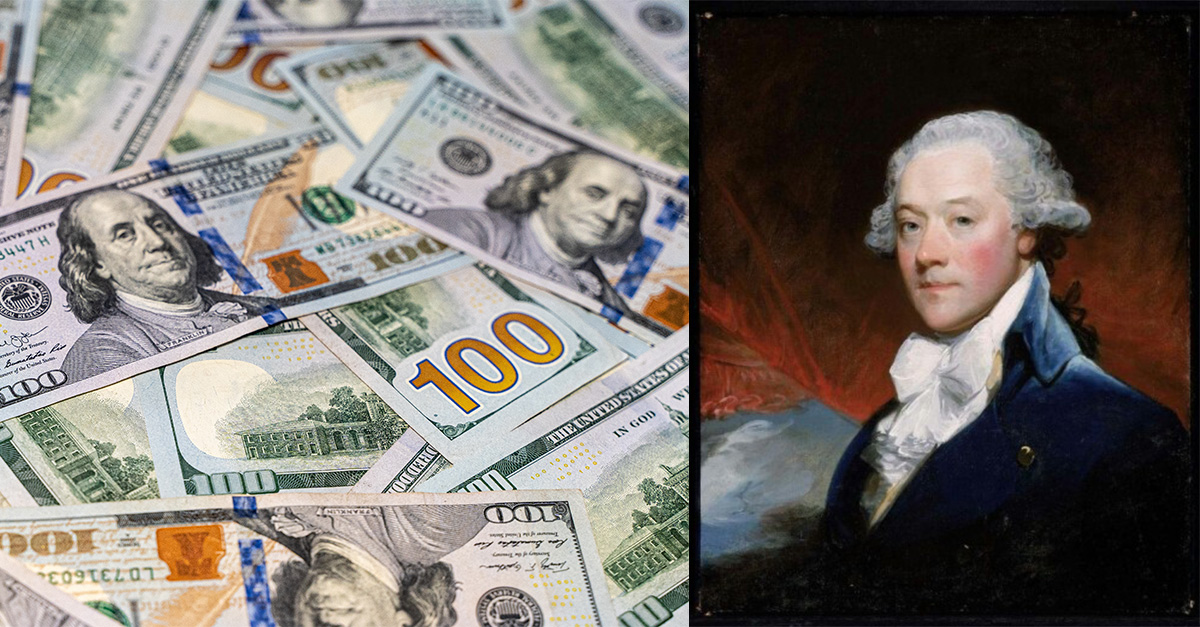


Get a free copy of Parental Rights & Education when you subscribe to our newsletter!

Unfortunately, this noble gesture in 1795 to settle slightly more than $2 million in war loans only shored up America’s balance sheet for a moment as the debt has continued to grow over the last 230 years and now stands at an unsustainable $35 trillion.
By the age of 22, James Swan, a Scottish immigrant turned prominent Bostonian, had been an early abolitionist, a member of the Sons of Liberty, an Indian in disguise during the Boston Tea Party, and a patriot wounded at Bunker Hill.
Why did a famous American who had once satisfied America’s war loans later spend 22 years in a debtor’s prison in France? Was he a patriot willing to use his considerable wealth to advance his country’s best interests or “a corrupt unprincipled rascal,” as President James Monroe once described him? Did he stubbornly refuse to acknowledge a financial obligation falsely attached to his name, or did he really not have the money to free himself?
The adventures of Swan’s life reveal either capitalistic greed or integrity of the highest honor. There may be a smattering of both. The question of his character will be yours to decide.
Yet neither Swan’s Revolutionary War patriotism nor his two-decade incarceration in a French prison is directly connected to This Week in History.
Rather it’s what he did on July 9, 1795, that earns him a place in this column. It was on that day when James Swan, singlehandedly, eliminated America’s foreign debt.
Swan was actually one of the wealthiest Americans of his day, thanks to a combination of inheritance and shrewd land speculation; by age 29, he reportedly had accumulated 2.5 million acres of prime real estate in the mid-Atlantic and New England regions.
Unfortunately, America’s financial uncertainty in its earliest years forced Swan to begin pursuing opportunities in France during the French Revolution. He took advantage of the friendship he developed with the Marquis de Lafayette and began trading with France, selling them military supplies and food, lumber, leather, and other necessities for the people.
But France also desperately needed money and so it decided to call in the loans it had made to U.S. patriots during their own revolution, a debt the U.S. had fallen behind on and had essentially stopped paying thanks to its nascent political struggles and a deep recession after the war.
Now drowning in its own debt, the French asked Swan to negotiate with the more stable and solvent U.S. government that had been fully implemented in 1789.
Treasury Secretary Alexander Hamilton agreed to issue new interest-bearing shares to raise the money, but many U.S. investors were hesitant to help.
So Swan, whether patriotic or greedy, stepped in and agreed to purchase every last one of the shares, effectively satisfying American’s war debt to France.
Capitalist that he was, Swan turned around and sold most of the shares to other private investors, who earned a healthy 4.5 to 5.5 percent return on the deal.
Swan would later help the U.S. government finance the 1803 Louisiana Purchase from Napoleon’s France.
Like many a speculator and businessman, Swan’s fortunes would rise to the highest heights and fall to the lowest lows.
Ironically, the man who would pay off America’s debt would one day find himself a debtor, and this is where the story takes a mythic turn.
The question of truth vs. tall tales appears to be undiscernible in many of Swan’s dealings in both Revolutionary and Napoleonic France.
Did one of his ships, the Sally, secretly store the belongings of King Louis XVI and Queen Marie Antionette as French loyalists connived to secretly remove the couple from their imprisonment in Paris to freedom in Maine before the guillotine separated their heads and torsos? Were the royal family’s personal belongings eventually distributed to others living in America, purchased from Swan’s business?
Historians can only offer speculation as to how they got there, but New England museums declare the whereabouts of an exquisite collection of furniture, tapestries, and other priceless pieces.
By the early 1800s, Swan was hoping to permanently return home to America and rebuild his mansion on the Atlantic seashore. But in 1808, on what would be his last return trip to France, he was arrested for failing to pay an insignificant amount of debt to a business partner.
He claimed that he never owed anyone in France any money. Whether honor and integrity were foremost, or Swan was simply unable to pay, he would be imprisoned in debtors’ prison and remain there for 22 years.
Embellishment of his activities during his incarceration run the spectrum of possibilities.
Did he live a lavish lifestyle thanks to the money sent from America, securing the finest benefits of debtor’s prison while assisting other prisoners with money so they could leave prison? Was he belligerent and so intensely loyal to honor and integrity that he refused to leave prison because it was the “right thing to do,” or was he so destitute and pathetic that prison officials decided kick him out when a new administration in France assumed power?
Regardless, in 1830, he finally left prison, met with Marquis de Lafayette, and died within a few days, never to return home to America. A French prison official later surmised that “the great air of liberty suffocated him.”

Although it’s impossible to know all the facts of James Swan’s colorful life, his patriotic fervor was evident throughout his life.
His writings and actions advocating for the abolition of slavery helped establish the moral, religious, and business arguments that led to later efforts to make chattel slavery illegal in Massachusetts. He fought valiantly for his country and is now believed by some to be the young, barefoot, blond soldier protecting the dying General Joseph Warren in John Trumball’s famous painting “The Battle of Bunker’s Hill.”
And, of course, Swan’s decision to voluntarily pay off America’s foreign debt helped put a fledgling American government on solid financial and diplomatic footing.
Two million dollars was an incredible amount of money for one person to pay to rid America of her foreign obligations in 1795. Today, it would be worth more than $50 billion.
Unfortunately, America’s debt was not fully eliminated by Warren’s actions and it continued to grow.
The U.S. debt on July 8, 2024, was $34.85 trillion dollars. To put that into context, James Swan’s $2 million payoff would cover less than 1 minute of America’s $5 billion a day in increased debt.
It is impossible for anyone to fully comprehend this figure of $1 trillion, much less $35 trillion. But let’s attempt to compare these numbers to ideas that are more concrete.
One trillion seconds is the same as 31,709 years. One trillion dollar bills stacked on top of each other will reach 61,000 miles into the air. One trillion dollar bills laid end-to-end will circle the equator 46,700 times.
To reiterate, the United States of America is not just $1,000,000,000,000 in debt but $35,000,000,000,000 in debt — a number that grows exponentially every single day.
Proverbs 14:34 declares that “a wise man leaves an inheritance to his children’s children.” That being true, God by default reveals that foolish individuals are today making decisions about our children’s future and they don’t seem to care.
Proverbs 14:1 states, “The fool has said in his heart, ‘There is no God.’” Washington D.C. politicians are doing a lot of cardiac ruminations…and letting us all hear their ludicrous statements that, in one form or another, tell us: “Don’t worry about the debt.”
Currently, every taxpayer in America owes the federal government $267,000. If the complexity of debt and economics is beyond most Americans’ understanding, most either don’t care or don’t know enough to care. But they should.
There is no James Swan coming to the rescue for America today. For the first time in history, interest on the United States’ debt is the fourth largest expense, behind Medicare, Social Security, and national defense. These four outlays alone are greater than the yearly federal revenues.
All other federal expenditures are “paid for” with borrowed money.
Isaiah 9:6 states that “the government shall be upon His shoulder,” a prophetic declaration of Jesus’s role on earth. Until He comes again, Christians are to occupy positions in society, even in government.
One of the main areas where Christians can assist Him is by voting or even running for local and national office. If all Christians would vote, and vote their biblical values, while also praying for repentance and a turning back to God, America could be changed for the better in a very short period of time.
Continue to pray for our government leaders, that they would serve God and advance the good and restrain evil in America, and pray for God to revive the hearts of bold pastors, godly men, and righteous women to stand up and always do the right thing.
If you like this article and other content that helps you apply a biblical worldview to today’s politics and culture, consider making a donation here.

Notifications